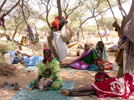
I watched the humanitarian crisis unfold in Darfur while I was at the U.S. Agency for International Development from 2003 to 2005, and the Sudanese government’s attitude toward relief was no less manipulative of humanitarian assistance than it was during the more than 20-year war with southern Sudan.
The government’s war strategy to destroy the livelihoods of Darfur’s non-Arab peoples—a strategy that has been well documented by Physicians for Human Rights, among others—has left nearly three million people almost wholly dependent on humanitarian assistance for their survival. As the government-backed Janjaweed rampaged through Darfur in 2003 and 2004, they destroyed food reserves, looted cattle, killed donkeys, and polluted water sources with their victims’ corpses. Food supplies dwindled, prices soared, malnutrition rates sky-rocketed, and the government deliberately slowed the arrival of humanitarian assistance for its suffering citizens.
On November 15, 2003 Khartoum blocked the first shipment of food bound for Darfur on the grounds that it was genetically modified. The Minister of Humanitarian Affairs called the food crisis “imagined,” and the government enacted labyrinthine procedures aimed at blocking and delaying the establishment of humanitarian operations. “Death,” writes author Gerard Prunier in his book Darfur: The Ambiguous Genocide, “had moved to the administrative level.”
The government’s embassies and consulates around the world processed visa requests at a glacial pace. When relief workers did eventually start arriving in Khartoum, they had to apply for travel permits to go to Darfur, and the delays continued. Once teams arrived in Darfur, they had to obtain permission from local officials to visit vulnerable populations outside of the regional capitals. The government usually cited ‘security concerns’ when issuing routine denials. Government customs delayed the release of vehicles, equipment, and relief supplies, including essential medicines. The Civil Aviation Authority even issued a directive that planes more than 20 years old could not enter Sudanese airspace, grounding many of the aircraft used to move food and relief supplies. And while relief agencies had difficulty getting jet fuel for the planes that could still fly, Khartoum had ample fuel for its own planes and helicopter gunships to bomb and strafe villages. Administrative delays continued throughout the summer of 2004, rains swept across Darfur and turned desert roads into impassable mud, and displaced civilians succumbed to hunger and disease while the world watched.
In the nearly five years since, U.N. agencies and international humanitarian organizations fought the bureaucratic constraints and increasing threats to their security to establish an operation in Darfur that has no doubt saved hundreds of thousands of lives. The Sudanese government’s claim that it can fill the enormous void left by the departure of 16 of the most effective of those organizations is patently absurd. The regime’s choice of the machete over the scalpel—i.e. expelling organizations rather than simply ramping up the manipulation of assistance—speaks to its increasing paranoia, but the regime knows full well the consequences of its actions for the people of Darfur.
To employ starvation as a weapon is violation of international law under the Geneva Convention and a crime against humanity according to the statute of the International Criminal Court, but warring parties are unlikely to consider the possibility of future penalties when the benefits of flouting international law are more immediate. And this is precisely why the international reaction to the expulsion of humanitarians is so critically important. If the Sudanese government does not reverse its decision or face harsh consequences for its actions, the immediate lesson for this regime and others like it is that for all of the rhetoric of human rights, international law, and responsibility to protect, the international community remains as toothless in the face of genocide as it was in Rwanda.
Read Part I of this post here.

